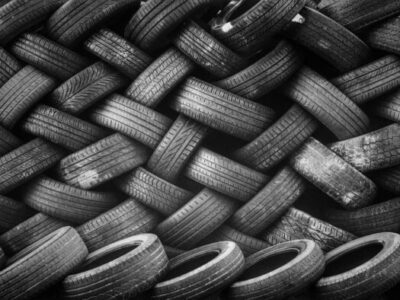Tires are essential for transportation safety. Whether on a car, airplane, bicycle, tractor, etc., they are the point of contact where “the rubber meets the road.” They absorb shock for increased comfort, provide traction to reduce skidding, and improve braking. They also wear out.
Worldwide, more than 1 billion tires are disposed of annually, with the United States accounting for more than 100 million, according to research by the Tire Industry Project.
As tire production grows, it is outpacing the recycling of end-of-life tires (ELTs). For example, according to the U.S. Tire Manufacturers Association’s 2019 Scrap Tire Management Report, 76% of scrap tires were recycled into asphalt, automotive products, sports turf, or landscaping materials. However, this is down from a high of nearly 96% in 2013.
Globally, over 40% of ELTs become secondary raw materials for a wide range of products. Another 15% generate energy in power plants and cement works. Scrap tires have a high calorific value, comparable to that of coal. However, tires are less carbon-intensive than coal, emitting less CO2 for the same amount of energy produced.
However, controlling emissions and the waste residue from burning tires made from multiple chemicals, plus synthetic and natural rubber, is expensive and complicated. Therefore, new tire disposal and recycling regulations are on the horizon in many countries, including the EU and India.
Further, Reuters reported in 2019 that global trade in waste tires has almost doubled in the past five years. Countries in Developing Nations, like India and Malaysia, buy scrap tires to burn in local furnaces to make low-quality oil.
However, a growing number of entrepreneurial companies are finding opportunities through circular practices. For example:
- LanzaTech is working with Bridgestone to scale up a closed-looped system that uses bacteria to break down the rubber and capture carbon. It then turns the carbon into biofuels, such as ethanol, that can be used to make polyethylene (PET) for packaging, polyester yarn, and surfactants used in consumer goods like laundry detergent.
- Ecore flooring company diverted more than 111 million pounds of truck tires from landfills in 2020. They collect scrap material from their manufacturing process and recycle it into their system. This is possible because rubber does not degrade through recycling like paper or plastics.
- NextLap Accelerator allows entrepreneurs to fast-track product ideas into scalable businesses. Industry partners and technical experts in construction, automotive, and sports equipment provide intensive training and mentoring for start-ups.








